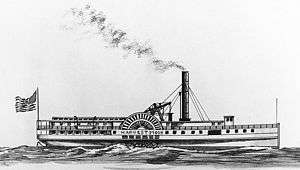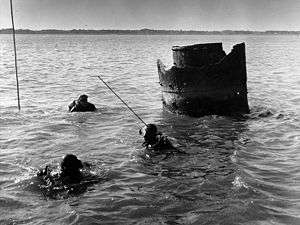USS Harvest Moon (1863)
The USS Harvest Moon was a steam operated gunboat acquired by the Union Navy during the American Civil War. She was used by the Navy to patrol navigable waterways of the Confederacy to prevent the South from trading with other countries.
 USS Harvest Moon in 1864-1865 | |
| History | |
|---|---|
| Name: | USS Harvest Moon |
| Namesake: | The full moon nearest the autumnal equinox. |
| Owner: | Charles Spear at Boston, Massachusetts |
| Laid down: | not known |
| Launched: | 1863 at Portland, Maine |
| Completed: | at the Boston Navy Yard |
| Acquired: | by Commodore Montgomery 16 November 1863 at Boston, Massachusetts |
| Commissioned: | 12 February 1864 at Boston |
| Fate: |
|
| General characteristics | |
| Type: | side-wheel paddle steamer |
| Displacement: | 546 tons |
| Length: | 193' |
| Beam: | 29' |
| Draught: | 8' |
| Propulsion: |
|
| Speed: | 15 knots |
| Complement: | not known |
| Armament: | four 24-pounder howitzers |
Constructed in Portland, Maine
Harvest Moon, a side-wheel steamer, was built in 1863 at Portland, Maine, and was purchased by Commodore Montgomery from Charles Spear at Boston, Massachusetts, 16 November 1863. She was fitted out for blockade duty at Boston Navy Yard and commissioned 12 February 1864, Acting Lieutenant J. D. Warren in command.
Civil War Service
Operating with the South Atlantic Blockade
Assigned to the South Atlantic Blockading Squadron, Harvest Moon departed Boston 18 February and arrived off Charleston, South Carolina, 25 February 1864. Next day Rear Admiral John A. Dahlgren made the steamer his flagship. After putting into Washington Navy Yard for repairs. Harvest Moon began her regular blockading duties 7 June 1864 off Charleston.
For the next nine months the steamer served off Tybee Island, Georgia, the North Edisto River, and Charleston harbor. During this period she also acted as a picket and dispatch vessel as well as Admiral Dahlgren's flagship.
Sinking
While proceeding in company with tug USS Clover shortly after 0800 on 1 March 1865 Harvest Moon struck a torpedo (mine) in Winyah Bay, South Carolina. Admiral Dahlgren, awaiting breakfast in his cabin, saw the bulkhead shatter and explode toward him.

The explosion blew a large hole in the ship's hull aft and she sank in 2½ fathoms of water. One man was killed. The admiral and the crew were taken on board USS Nipsic. Harvest Moon was stripped of her valuable machinery and abandoned 21 April 1865.
Attempts to raise Harvest Moon a century later
In 1963, nearly 100 years later, a project was initiated to raise Harvest Moon from the mud at the bottom of Winyah Bay and to restore the ship, but has made little headway.
References
This article incorporates text from the public domain Dictionary of American Naval Fighting Ships. The entry can be found here.